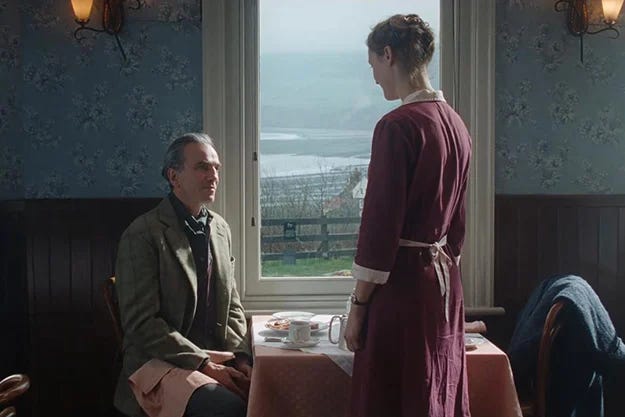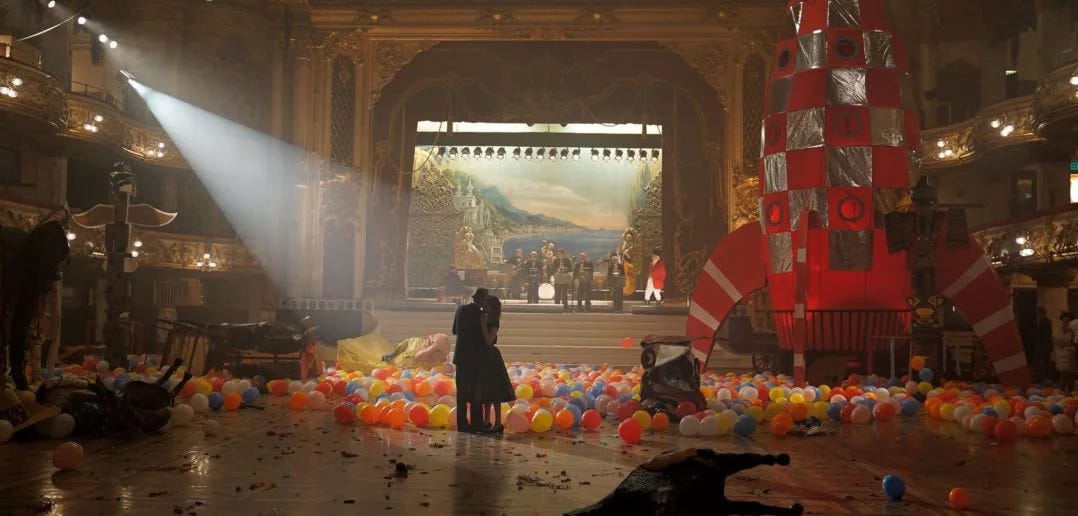Phantom Thread, directed by Paul Thomas Anderson and released in 2017, is a meticulously crafted film that explores themes of control, creativity, and the complexities of love. Set in the high fashion world of 1950s London, the film stars Daniel Day-Lewis in what he announced as his final film role, portraying the fastidious and exacting dressmaker Reynolds Woodcock. The film co-stars Vicky Krieps as Alma, a young woman who becomes his muse and later, his lover, and Lesley Manville as Cyril, Reynolds' sister and business partner. Phantom Thread is a nuanced, slow-burning drama that delves into the intricacies of relationships and the artistic process.
The narrative centers around Reynolds Woodcock, a renowned dressmaker whose life is governed by strict routines and an obsessive commitment to his craft. His world is upended when he meets Alma, a strong-willed waitress who becomes his muse and later, his lover. The film meticulously details the evolution of their relationship, highlighting the power dynamics and emotional complexities that arise. Alma’s initial role as a passive muse gradually transforms as she seeks to assert her own identity and influence within Reynolds’ rigidly controlled life.
One of the film’s most striking features is its exploration of the intersection between art and control. Reynolds’ meticulous approach to dressmaking is a metaphor for his need to control every aspect of his life. The garments he creates are masterpieces of precision, reflecting his uncompromising standards and the beauty that can emerge from such dedication. However, this control also extends to his personal relationships, where he attempts to mold those around him to fit his exacting expectations. Alma’s presence disrupts this dynamic, challenging Reynolds’ authority and introducing a chaotic element that ultimately becomes a catalyst for change.
Paul Thomas Anderson’s direction is masterful, emphasizing the film’s meticulous attention to detail and the rich textures of its world. The cinematography, also by Anderson, captures the elegance and austerity of the 1950s fashion scene, with an emphasis on the luxurious fabrics and intricate designs of Reynolds’ creations. The use of natural light and carefully composed shots enhances the film’s period authenticity and visual beauty, creating a sumptuous and immersive viewing experience.
The performances in Phantom Thread are central to its emotional depth and complexity. Daniel Day-Lewis delivers a mesmerizing performance as Reynolds, embodying the character’s meticulousness and vulnerability with incredible nuance. His portrayal captures the tension between Reynolds’ external composure and his internal turmoil, revealing the fragility beneath his controlled exterior. Vicky Krieps is equally compelling as Alma, bringing a quiet strength and resilience to her character. Her performance highlights Alma’s evolution from a seemingly passive muse to a woman who exerts her own will and agency. Lesley Manville’s portrayal of Cyril is also noteworthy, providing a sharp and pragmatic counterbalance to Reynolds’ obsessive nature.
The film’s score, composed by Jonny Greenwood, is a crucial element that enhances its atmosphere and emotional resonance. Greenwood’s music, characterized by lush strings and haunting melodies, reflects the film’s underlying tensions and the complexity of its characters’ relationships. The score’s blend of classical and contemporary elements mirrors the timeless quality of the film’s themes and adds to its overall sense of elegance and sophistication.
At its core, Phantom Thread is a love story, but one that subverts traditional romantic tropes. The relationship between Reynolds and Alma is marked by power struggles and mutual manipulation, yet it also reveals a deep and abiding connection. The film suggests that true intimacy can only be achieved through a balance of power and a willingness to embrace vulnerability. Alma’s unconventional approach to this balance, particularly her use of poisoning as a means of controlling Reynolds, adds a darkly humorous and provocative layer to the narrative. This element of the story challenges conventional notions of love and power, highlighting the lengths to which individuals will go to assert their agency and maintain equilibrium in their relationships.
Phantom Thread is a richly textured and emotionally complex film that explores the intricate dynamics of creativity, control, and love. Through its meticulous direction, exceptional performances, and evocative score, the film delves into the nuances of human relationships and the sacrifices inherent in the pursuit of artistic perfection. Paul Thomas Anderson’s masterful storytelling and the outstanding contributions of his cast and crew make Phantom Thread a compelling and thought-provoking cinematic experience. It stands as a testament to the power of film to illuminate the depths of human emotion and the complexities of the human condition.
Phantom Thread.
In the house of fabric and silence,
the needle’s eye pierces
what cannot be spoken.
He sews his name into every seam,
a whisper of control,
a weight the gowns must bear.
Here, love is a measured thing—
lace tight against the throat,
a corset’s quiet tyranny.
You arrive,
your hands as steady as his gaze,
your presence —
an unexpected thread pulling taut.
The mushroom waits,
hidden among the herbs,
pale cap bruising under the blade.
You stir it into his tea,
not with malice, but with the tender logic
of necessity.
He swallows —
the body unspools,
the master reduced,
pliable as silk in a tailor’s hands.
He trusts you now,
in the language of poison and surrender.
Love demands this —
a ruin, a renewal.
What can be sewn
must first be unraveled.









I had seen the trailers for this movie in theatres and thought it might not be for me. But the way you’ve written about it and illuminated its themes makes me want to watch it.
Thank you.
I enjoyed this movie, but it wasn't my favourite of the year. (Not that I remember what *was*, mind you.) However, very occasionally a piece of it will pop into my head, whether it's a small moment of cinematography or just the idea of how they balance their relationship.
Didn't The Beguiled come out around the same time? It was definitely a year for women exerting control through mushrooms!
"The film suggests that true intimacy can only be achieved through a balance of power and a willingness to embrace vulnerability." I think the film's suggestion is correct. But the hardest part for many of us is the vulnerability, isn't it?
Now! *claps hands together* I love having a poem after a movie review and will forever be disappointed in all other reviews I read.
(Also: "a whisper of control, a weight the gowns must bear"? PLEASE. 🤌🏼)